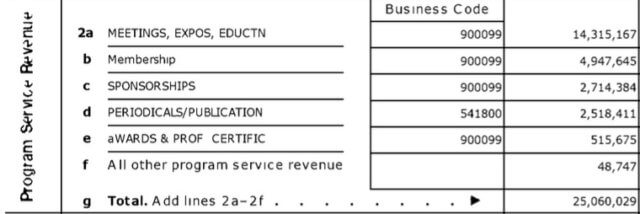The corrosive effect of commissions on the meetings industry
Let’s talk about the corrosive effect of commissions on the meetings industry.
Our industry is abuzz about the news of Marriott’s decision to cut third-party commissions for group bookings by thirty percent. And the response has been “harsh“, especially because of the extremely short notice (it will be going into effect on March 31, 2018) and once it became known that four large site selection firms would be “granted a temporary exception“.
Marriott’s announcement sparked the potential of a commission war (some independent properties are raising group booking commissions). It led to fear of further reductions or elimination of commissions by other suppliers in the future. Taking a wider view, let’s talk about the corrosive effect of commissions on the meeting industry.
(I think the following points are pertinent to any industry that pays commissions, but that’s a topic for another post.)
Why are group booking commissions “corrosive”?
Let’s go back to basics. When a supplier pays an independent agent commission on a group booking, the agent benefits financially. This financial transaction does not directly involve the agent’s client (who may not even be aware of it). The agent, then, is not depending solely on client fees for income.
Who is the agent’s customer? Ideally, it would be 100% the client. From the client’s point of view, the agent’s job is to find the venue that best meets the client’s needs. But when commissions enter the picture, the question arises as to whether the commission-paying supplier is now the customer too. After all, the agent provides a service (a sale!) for the venue — and receives payment for it. And that leads to concerns that should be on the mind of any client who is aware that commissions will be paid. Did my agent steer me to this property because they stand to make money from recommending it, rather than because it’s the best choice for me? Can I continue to trust this agent to act in my best interests?
Trust
Remember one of Jerry Weinberg’s ten laws of trust: “Trust takes years to win, moments to lose.”
The real estate industry, which works solely on commission, is upfront about brokerage commission fees, which, though sometimes negotiable, are typically uniform and clearly included in client-broker contracts. The meeting industry does not generally match such levels of uniformity or transparency. For example, I often negotiate with non-traditional meeting venues. None of them have ever offered me a commission (and I would have been surprised and declined if they had). In my experience, commissions can range between 0 – 15%.
Of course, experienced clients are aware of the existence of commissions, and ethical agents disclose them. Nevertheless, commissions tie intermediaries to vendors who pay them, obscure financial transparency. Commissions muddy the waters as to whether the agent is solely acting in the client’s best interest. A naive client may see an agent receiving commissions as less expensive than one who is totally fee-based.
To summarize, group booking commissions are corrosive because they reduce clients’ trust in the impartiality of meeting planners, and they hide and/or distort the financial considerations underlying a booking.
Why trade associations are silent
Compared to the strong response from independent planners, trade associations have been “largely silent” to the Marriott announcement. The few official responses provide excellent examples of how to issue a statement that says nothing substantial.
This is not surprising, due to the financial model adopted by these associations. Kyle Hillman points out that it relies on supplier financial support to the extent that they will not say anything that might offend suppliers.
“…stop looking to the trade associations for help. It isn’t that they are bad, they are just not setup to be independent voices here. Their entire financial structure is based on supplier funding. No matter how egregious a situation is for planners or industry professionals, they can’t get involved without risking their primary revenue source. On internal issues within the industry – trade associations are not our advocates…”
“…I think we romanticize MPI, PCMA, ASAE as our champions when that isn’t their role. Their role is to provide enough value to members so that they can facilitate sellers soliciting their goods. They were never designed to be advocates for buyers.”
—Kyle Hillman, Facebook Industry Friends Group
As a side observation, at least MPI and PCMA do not claim that they only represent meeting planners, but ASAE — the American Society of Association Executives — does not have that excuse if its name correctly portrays the people they claim to represent!
For this article, I researched the relative numbers of buyer versus supplier memberships at MPI, PCMA, and ASAE but found nothing on their websites (feel free to share in the comments if you know). Unfortunately, these organizations’ annual 990’s do not break out buyer versus supplier support, though the program income figures are interesting and shown below. (The 2015 returns are the most recent I could access.)



Regardless, intermediaries have no major association to represent their collective concerns. (Senior Planners Industry Network {SPIN} has published a petition demanding equal commissions from Marriott for all intermediaries.)
Corrosive conclusion
The upheaval caused by Marriott’s abrupt unilateral decision to slash intermediary commissions has created consternation for third parties who have relied on these commissions for a portion of their income. Is this the beginning of a trend like the one begun in 1995 when airlines capped and eventually cut commissions to travel agents? We can, however, take some encouraging lessons from the travel agent industry which, in response, reinvented its business models and, though the number of agencies has shrunk by two-thirds, is perhaps the healthiest it has been in years.
Paradoxically, those intermediaries who work solely on a fee-basis and do not rely on venue commissions are in a good position to increase their business as a result of Marriott’s decision, compared to other agents who may now need to find additional revenue sources, or perhaps even leave what is a demanding and difficult business. Ultimately, intermediaries relying less on commissions’ contribution to the bottom line will reduce the corrosive effect of commissions on the meetings industry.


 Professional, trade, and public interest associations are significant businesses. In the United States alone,
Professional, trade, and public interest associations are significant businesses. In the United States alone,